"Send In the Clowns" is a song written by Stephen Sondheim for the 1973 musical A Little Night Music, an adaptation of Ingmar Bergman's 1955 film Smiles of a Summer Night. It is a ballad from Act Two, in which the character Desirée reflects on the ironies and disappointments of her life. Among other things, she looks back on an affair years earlier with the lawyer Fredrik, who was deeply in love with her, but whose marriage proposals she had rejected. Meeting him after so long, she realizes she is in love with him and finally ready to marry him, but now it is he who rejects her: He is in an unconsummated marriage with a much younger woman. Desirée proposes marriage to rescue him from this situation, but he declines, citing his dedication to his bride. Reacting to his rejection, Desirée sings this song. The song is later reprised as a coda after Fredrik's young wife runs away with his son, and Fredrik is finally free to accept Desirée's offer.

Harry Von Tilzer was an American composer, songwriter, publisher and vaudeville performer.

Tin Pan Alley was a collection of music publishers and songwriters in New York City that dominated the popular music of the United States in the late 19th and early 20th centuries. Originally, it referred to a specific location on West 28th Street, between Fifth and Sixth Avenues in the Flower District of Manhattan, as commemorated by a plaque on 28th Street between Broadway and Sixth. Several buildings on Tin Pan Alley are protected as New York City designated landmarks, and the section of 28th Street from Fifth to Sixth Avenue is also officially co-named Tin Pan Alley.

A refrain is the line or lines that are repeated in music or in poetry — the "chorus" of a song. Poetic fixed forms that feature refrains include the villanelle, the virelay, and the sestina.

The 32-bar form, also known as the AABA song form, American popular song form and the ballad form, is a song structure commonly found in Tin Pan Alley songs and other American popular music, especially in the first half of the 20th century.
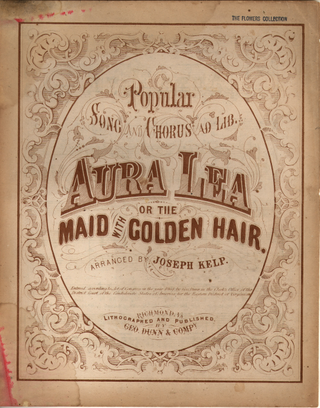
"Aura Lea" is an American Civil War song about a maiden. It was written by W. W. Fosdick (lyrics) and George R. Poulton (music). The melody was used in Elvis Presley's 1956 hit song "Love Me Tender".
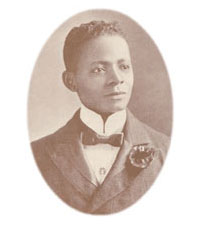
Gussie Lord Davis was an American songwriter born in Dayton, Ohio. Davis was one of America's earliest successful African-American music artists, the first black songwriter to become famous on Tin Pan Alley as a composer of popular music.
Herr Mannelig is a Swedish folk ballad that tells the story of a female mountain troll (bergatroll) who proposes marriage to a young human man. The troll is trying to convince "Sir Mannelig" to marry her. She offers him many gifts but he refuses her because she is not a Christian. It is also implied that the troll is actually a pagan woman, and that the song symbolizes a young Christian man resisting material gain that would come with apostasy.
"There Was an Old Lady Who Swallowed a Fly" is a children's rhyme and nonsense song of a kind known as cumulative. Alternative titles include "There Was an Old Lady", "I Know an Old Lady Who Swallowed a Fly", "There Was an Old Woman Who Swallowed a Fly" and "I Know an Old Woman Who Swallowed a Fly". An early documentation of the story appears in English author Dorothy B. King's 1946 book Happy Recollections.
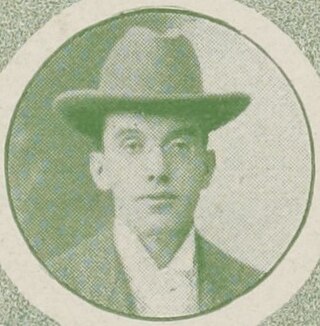
Arthur J. Lamb was a British lyricist best known for the 1897 song "Asleep in the Deep" and the 1900 song "A Bird in a Gilded Cage". He collaborated with many song-writers, including siblings Albert Von Tilzer and Harry Von Tilzer, Henry W. Petrie and Kerry Mills.
"I Guess I'll Have to Change My Plan" is a popular song published in 1929, with music by Arthur Schwartz and lyrics by Howard Dietz.

"Red Wing" is a popular song written in 1907 with music by F.A Mills and lyrics by Thurland Chattaway. Mills adapted the music of the verse from Robert Schumann's piano composition "The Happy Farmer, Returning From Work" from his 1848 Album for the Young, Opus 68. The song tells of a young Indian girl's loss of her sweetheart who has died in battle.

"The Lonely" is a song by American singer-songwriter Christina Perri. The song was first released to iTunes on March 29, 2011, the same day that its accompanying lyric video premiered on Teen Vogue. The video was uploaded onto her official YouTube account the following day. The song is included on Perri's debut album, Lovestrong. It was released as the first promotional single of the album.

On the Old Fall River Line is a song composed in 1913 by William Jerome (words), Andrew B. Sterling (words) and Harry Von Tilzer (music) set on a steamship of the Fall River Line of steamships between New York and Newport, Rhode Island, which connected with trains from Newport to Boston. Von Tilzer had often traveled the line and was inspired by honeymooners "stirred to romantic depths by the alliance of shadowy darkness, twinkling stars, softly lapping waves and stately moving ships." Popular during World War I, especially among New England soldiers, it was also "much parodied." It is a cheerful, up-tempo ditty, but, typically of its time, "there is a final twist to married bliss with the final chorus line of: 'But I wish "oh Lord" I fell overboard, On the old Fall River Line.'" Described by the New York Times as "a popular song of a quarter century ago" in 1937, its full chorus was used that same year in Time Magazine's article on the passing of the old steamboat line. Although still garnering a place in Billboard's 1949 listing of "Harry Von Tilzer's Best Known Songs" as late as 1949 and being described as "a famous verse" by The Christian Science Monitor in 1950, a dozen years after the last ship had sailed, it is less remembered today, although not completely forgotten. Modern-day performers have included Steve Martin and Tiny Tim.

"I Want a Girl (Just Like the Girl That Married Dear Old Dad)" (sometimes shortened to "I Want a Girl") is a popular song of 1911 composed by Harry Von Tilzer and with lyrics by William Dillon, which has become a barbershop quartet standard.
Shapiro, Bernstein & Co., Inc. is an American music publishing company established in 1900.

Ah! May the Red Rose Live Alway is a song written and composed by Stephen Foster in 1850. This song is written in the style of a parlor ballad – a genre of popular song at the time intended to be performed at a slow tempo and to communicate a sentimental quality.
"When This Cruel War Is Over", also known under the title "Weeping, Sad and Lonely", is a song written by Charles Carroll Sawyer with music by Henry Tucker. Published in 1863, it was a popular war song during the American Civil War, sung by both Union and Confederate troops.
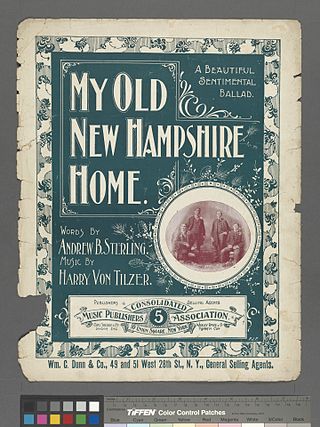
"My Old New Hampshire Home" is an 1898 song that was the first popular hit of composer Harry Von Tilzer, with lyrics by Andrew B. Sterling.
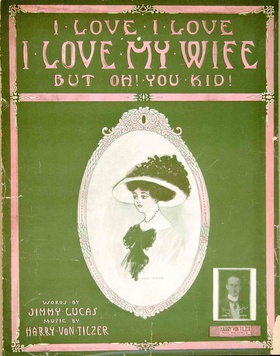
"Oh! You Kid!" was the title, or part of the title, of several popular songs published in 1908 and 1909. It became a widely used popular catchphrase. The most successful song using the phrase, "I Love, I Love, I Love My Wife – But Oh! You Kid!", was written by Harry Von Tilzer and lyricist Jimmy Lucas, and recorded by the duo of Ada Jones and Billy Murray.














